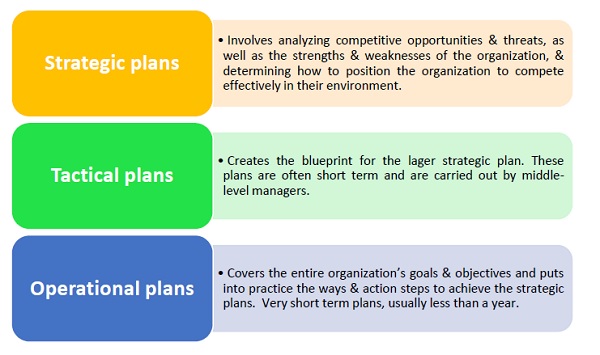
- Management Principles - Home
- Management - Overview
- Management - Role Of Managers
- The P-O-L-C Framework
- Management - Ecosystem
- Management - Environment
- Management - Factors Affecting
- Management - Organization
- Management - Leadership Styles
- Management - Framework
- Mission,Vision and Values
- Personalty and Attitude
- Work Attitude and Behaviour
- Decision Making
- Decision Making Nature Significance
- Factors Affecting Decision Making
- Decision Making - Styles
- Decision Making - Tools
- Management - Planning
- Planning - Introduction
- Types Of Plans
- The Planning Environment
- Organizational Structure
- Importance Of Organizing
- Principles Of Organizing
- Organizational Structure
- Organizational Process
- Change Management
- Organizational Change
- Organizational Change Factors
- Organizational Change Management
- Globalization and Its Effect
- Multinational Organizations
- Global Ecosystem and its Impact
- Management Useful Resources
- Management - Quick Guide
- Management - Useful Resources
- Management - Discussion
Management Principles - Types Of Plans
Plans commit the various resources in an organization to specific outcomes for the fulfillment of future goals. Many different types of plans are adopted by management to monitor and control organizational activities. Three such most commonly used plans are hierarchical, frequency-of-use (repetitiveness) and contingency plans.

Strategic Plans
Strategic plans define the framework of the organizations vision and how the organization intends to make its vision a reality.
It is the determination of the long-term objectives of an enterprise, the action plan to be adopted and the resources to be mobilized to achieve these goals.
Since it is planning the direction of the companys progress, it is done by the top management of an organization.
It essentially focuses on planning for the coming years to take the organization from where it stands today to where it intends to be.
The strategic plan must be forward looking, effective and flexible, with a focus on accommodating future growth.
These plans provide the framework and direction for lower level planning.
Tactical Plans
Tactical plans describe the tactics that the managers plan to adopt to achieve the objectives set in the strategic plan.
Tactical plans span a short time frame (usually less than 3 years) and are usually developed by middle level managers.
It details specific means or action plans to implement the strategic plan by units within each division.
Tactical plans entail detailing resource and work allocation among the subunits within each division.
Operational Plans
Operational plans are short-term (less than a year) plans developed to create specific action steps that support the strategic and tactical plans.
They are usually developed by the manager to fulfill his or her job responsibilities.
They are developed by supervisors, team leaders, and facilitators to support tactical plans.
They govern the day-to-day operations of an organization.
Operational plans can be −
Standing plans − Drawn to cover issues that managers face repeatedly, e.g. policies, procedures, rules.
Ongoing plans − Prepared for single or exceptional situations or problems and are normally discarded or replaced after one use, e.g. programs, projects, and budgets.